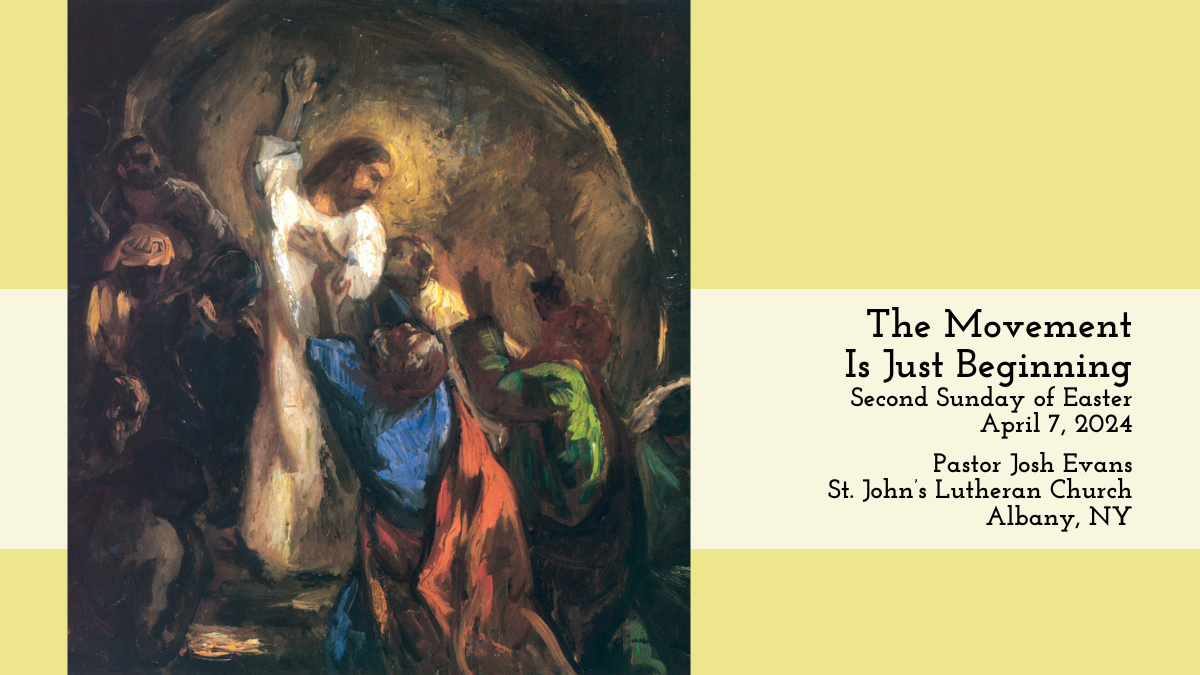St. John’s Lutheran Church
7 April 2024 + Second Sunday of Easter
John 20:19-31
Rev. Josh Evans
If the villains of Holy Week are Judas and Peter, then the villain of Eastertide is Thomas.
Doubting.
Thomas.
Who earns his infamous title not even for anything particularly egregious that he does … but solely for being absent when Jesus happened to show up.
It hardly seems fair – that this is Thomas’ reputation.
The other disciples, huddled in their house with the doors locked, don’t get scolded for cowering in fear.
After all, their worst nightmare had come true: their rabbi had been killed, and they were next. The movement was over. Indeed, there was no reason to hope. No reason to expect anything different.
And did you notice … that the doors are still shut – probably locked – even after they “have seen the Lord”?
Fear – not alleluias – is the commonplace response to Jesus’ death and even the news of his apparent resurrection.
Fear is where we left the women at the tomb in Mark’s gospel on Easter Sunday. Good Friday was all they knew. After helplessly looking on from a distance, witnessing the execution of their teacher and friend, moving through the fog of grief and confusion over the days ahead, the woman came to the tomb expecting death. More of the same.
The movement was over. There was no reason to hope. No reason to expect anything different.
For Thomas, the movement was over.
Thomas had invested so much of his time, energy, and hope into this movement.
A movement, John tells us, that he was once willing to risk his own life for:
When Jesus had learned that his dear friend Lazarus had died, it was Thomas who boldly insisted the disciples join their teacher and friend on his journey to visit the bereaved family … a journey that would also begin Jesus’s path to Jerusalem and the events of Holy Week: “Let us also go, that we may die with him,” Thomas declares.
Some time later, when Jesus was offering his parting words to his disciples, it was Thomas who was the first to speak up: “Lord, we do not know where you are going. How can we know the way?”
Out of his deep concern for the movement they had been building, it is Thomas alone who gives voice to what the other disciples were also surely feeling but were too timid to name: Is the movement over? What’s going to happen to Jesus? What’s going to happen to us?
Far from “doubting,” Thomas had been so bold in his faith and his willingness to follow Jesus – even to death. Thomas had been so committed to the movement Jesus was building – and rightfully nervous about the prospect of losing their leader and teacher and friend to an unknown place.
Thomas, all the evidence tells us, was an exemplar of faith…
…until everything he had put his faith into seemingly came crashing down around him.
No wonder Thomas isn’t with the others. His teacher and friend had just been arrested, tortured, and killed at the hands of a powerful empire, like so many others who dared to question the empire’s authority before him.
The movement was over – done – dead. There was no reason to expect anything different. It was time to pick up the pieces and move on.
***
The women were so afraid that they told no one. The other disciples were so afraid that they locked themselves in the house. Thomas was so afraid that he couldn’t bring himself to stick around.
Grief does weird things like that.
And it is precisely into this atmosphere of fear, grief, and uncertainty that the risen Christ appears –
not with a demeaning new nickname for his “doubting” disciple – not with a reprimand for not believing unflinchingly in the resurrection none of them had any reason to expect – not with any judgment or shame –
but with words of promise and comfort: Peace be with you.
***
Peace be with you: in your fear that it’s all over.
Peace be with you: when you have no reason to expect anything different.
Peace be with you: when you’re afraid the worst is yet to come.
Peace be with you: in all the doubts and questions along the way.
Peace be with you.
The movement is just beginning.


